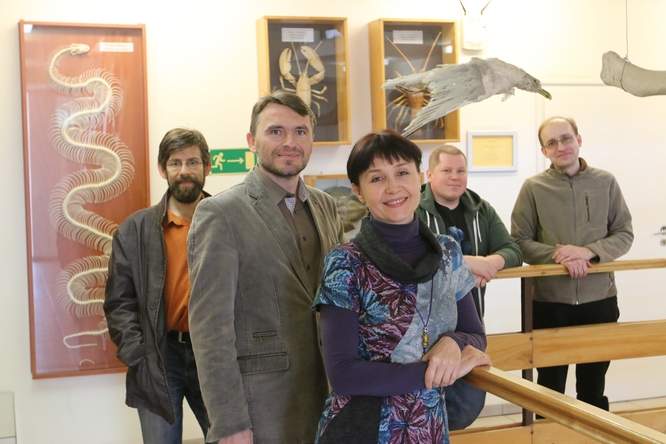Chair of Biosystematics

Chair of Biosystematics
Chair of Biosystematics conducts research in zoology, botany, paleobiology and ecology. Its world research successes are possible thanks to a lively cooperation with many scientific institutions resulting in numerous publications, scientific promotions, grants, participation in conferences and organising them, placements abroad, and scientific expeditions. Staff members conduct, among others, research excavations in Krasiejów, one of the most important paleontological excavation sites in the world. The Chair is participating in the establishing of the Agro-Training and Research Centre of Opole University in Prószków. Its scientists continue to describe newly discovered breeds of insects and plants, develop new research methods, which are used all over the world.
Research areas:
- systematics
and phylogenesis of Heterotera;
- review of
chosen genera of Ephydridae (Diptera) family;
- avifauna and
chiropterofauna;
- flora of
anthropogenic habitats;
- mechanisms
of restructuring of vascular cambium cell system;
- ecological
research on pine forest lichen;
- the size and
accessibility of nest sites as reason for polydomy of Temnothorax ants;
- flora of
fish breeding ponds and their role in preserving biodiversity;
- biodiversity
and morphological changeability of invertebrates and vertebrates from the Triassic and Cretaceous periods;
- biodiversity
and history of flora and lichen of Eurasia;
- relationship
of chosen insect groups with the use of molecular phylogenetics;
Study programmes:
Biology was founded at the University of Opole in 1997. Since then this field of studies has been developing intensely giving students enormous possibilities to pursue their interests in natural science. We conduct studies on all three levels. Modern research base and young scientists guarantee good atmosphere for studying and possibilities for gaining practical skills. One of the great opportunities for obtaining knowledge is to take part in scientific camps organised annually by the Chair of Biosystematics. We organise summer entomological and excavation camps in Krasiejów, one of the most precious paleontological sites in the world. Students regularly participate in scientific conferences and seminars, both national and international.
Graduates have broad knowledge of biology and environmental protection. They can conduct field research and work in their speciality working in laboratories and research institutes.
The study syllabus includes courses from the field of biology, such as: botany, zoology, ecology of plants and animals, microbiology, human anatomy, genetics, physiology of plants, evolutionism, cell biology, interdisciplinary like biotechnology; chemistry, e.g. chemistry and biochemistry; environmental protection, mathematical and physical sciences like mathematics, statistics, modelling of natural phenomena and physics.
Graduates can work in:
- Research
institutes
- Biological
diagnostic and research laboratories
- Environmental
protection units
- Agriculture
and urban engineering
- Food
processing companies
- State
administration
- School
system
Admission information:
https://rekrutacja.uni.opole.pl/kierunki.php?tryb=katalog
More information: http://biologia.uni.opole.pl/show.php?id=40
Contact:
Chair of Biosystematics
ul. Oleska 22, 45-052 Opole
Phone: +48 77 401 6010,
E-mail: kbios@uni.opole.pl
Web: http://biologia.uni.opole.pl
Erasmus+ website: http://biologia.uni.opole.pl/show.php?id=78

